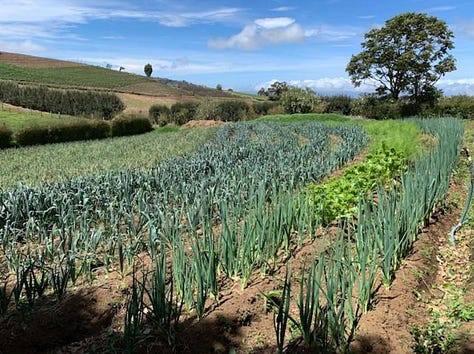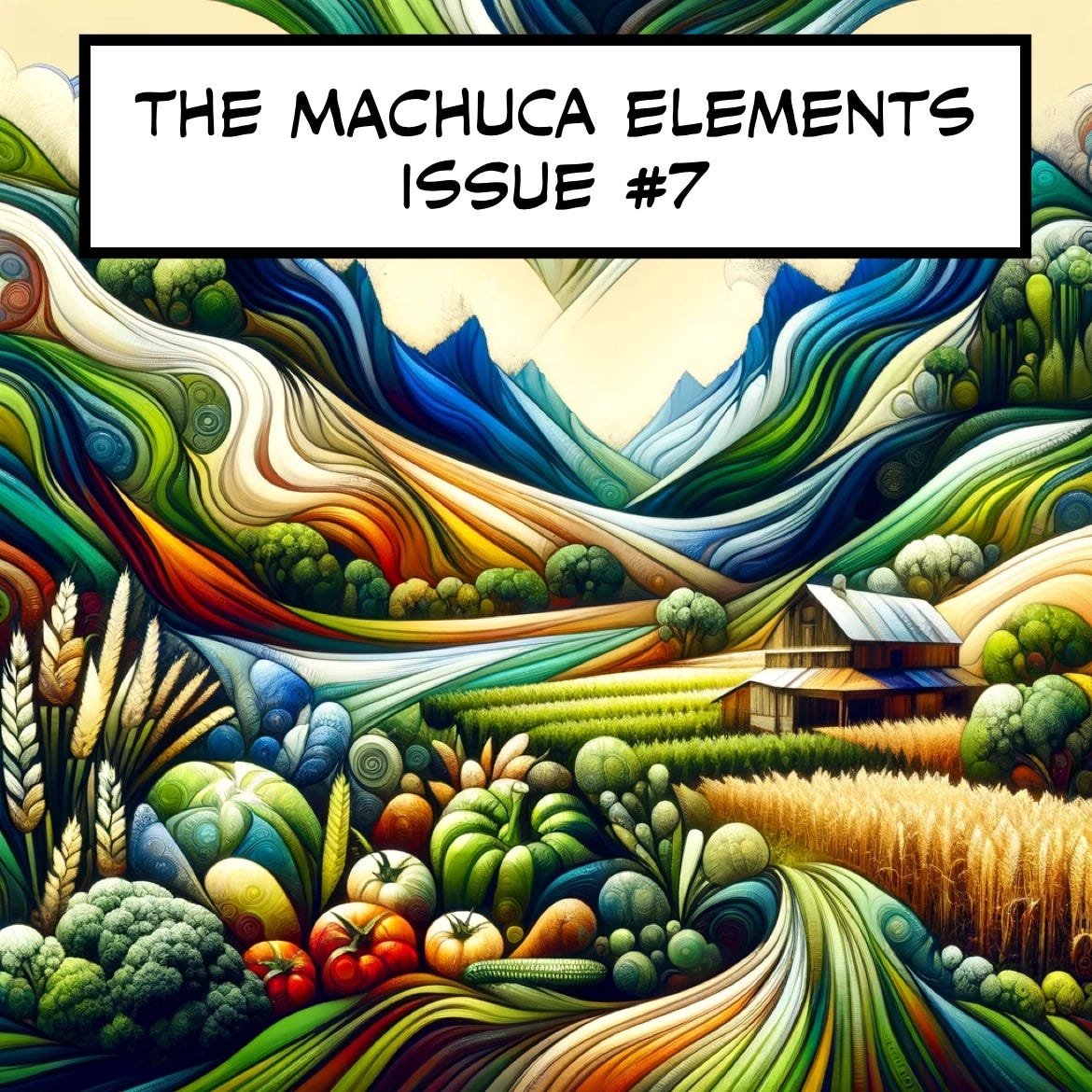Issue #7: Sustainable Producers: Spotlight on Tierra de Sueños by Keith and Amanda Stern-Pirlot
Ileana and Brayner's Journey from Traditional Farming to Sustainable Agriculture
by Keith and Amanda Stern-Pirlot
This article is the first in a series about farmers and other food producers with organic or otherwise sustainable practices who are part of the Machuca Valley community.
Today we focus on Ileana and Brayner, whose farm in Zarcero named Tierra de Sueños, supplies us with organic vegetables and fruits every Wednesday. Excerpts from a trip report we wrote two years ago were used to frame a recent interview with Brayner and Ileana.
A healthy and vital energy permeates the air as we climb the mountain toward Zarcero, between Naranjo and Ciudad Quesada. And when we arrive at Tierra de Sueños, we fine a farm tended by kind people, nestled by clouds, cooled by fresh breezes and bathed by the sun. A farm that’s everything dreams can be when they’re brought down to earth and planted in fertile soil, as was done some thirty years ago when Juan Jose, Ileana’s father-in-law and the founder of this mutigenerational family farm, began to cultivate something that’s rare even to this day: a healthy and mutually beneficial relationship with nature. He did this by listening to the land and closing his ears to fast-talking industry, thereby setting him and his descendants on the path of organic and regenerative farming. We’re grateful to have answered their call to visit the farm and these lovely people from which our Wednesday Machuca Valley deliveries originate.
The farm consists of two sites: one cascading down a hillside where they focus more on cultivating amendments for heathy soil and sprouting plants in greenhouses, and the other, more Edenic, with a small but deep forest opening onto multiple hillsides filled with deep furrows following natural contours.
At the heart of this biodynamic system is the forest where Brayner, Ileana’s husband, respectfully collects microorganisms for cultivation, forming the foundation of their organic and biodynamic growing process. The forest is not only the source, but also the model upon which Tierra de Sueños bases their farming practices—a dynamic ecological balance, resilient, healthy and whole, the products of which are rich in nutritive benefit.
Brayner and Ileana didn’t always farm in this way, but they were motivated to change to improve their earnings and the health of their families, and to be able to involve their children in the family business without endangering their health. Brayner says:
We also began to see how our soils were improving every day; they were more fertile and this made us feel more enthusiastic to continue moving forward in this process.
Regarding the economic model of selling direct to consumers, including those of us in the Machuca Valley, Brayner says:
When we started, we were selling to supermarket chains who normally set the price. Seasonally, there were a lot of product returns. Over time we started selling to hotels and faced the same circumstances, sometimes they paid us the price they wanted and set the payment terms as 15 days but often didn’t pay for as long as 3 months. At this time, we were producing at very high volumes. Then we began selling at the farmer's fairs and innovating with non-traditional products and there we reached the consumer in a more direct way. Thanks to this a more direct market was opened where we have been able to obtain prices fairer for us and for the consumer. This is because when selling to big chains, the producer sells at a low price, sometimes not even enough to cover the cost of production, and the commercial chains increase their price by up to 300 or 400%, sometimes even more.
Thanks to sales in the Machuca valley and other places we have been able to grow, and obtain fairer prices which allows us to improve the farm, its structures, supplies, and delivery vehicles, in order to provide better service and quality to our clients.
In a modest outbuilding on Ileana and Brayner’s property, mycorrhizal fungi and beneficial bacteria are cultivated, alongside natural pesticides made from homegrown ingredients for use at both sites. Nearby, there are also greenhouses for seedling starts and drying some crops such as wheat and onions. The hillside is replete with covered rows of beautiful vegetables. At Juan Jose’s property, edible crops cover nearly every inch of land, grown between deep furrows designed to naturally mitigate erosion and compaction from rain on these steep hillsides. But this mode of production is not without its challenges.
We have had to adapt our thinking and practices, going from planting 3 or 4 products in large quantities to growing more than 50 products, which entails better organization, planning, and labor.
It is also a challenge for us to maintain product quality for our clients because of climate changes, new pests, and new diseases. We are not able to get help from the government, or state, to solve these problems. On the contrary, many times they see us as a problem because we are doing things differently, challenging the interests of large transnationals both in chemical inputs and medicines.
The Tierra de Sueños family continues to experiment and innovate, testing new crops and practices. During our visit they showed us their new experiments with asparagus and wheat, and took us to visit their young bulls, who turn their organically grown diet of plant leftovers into fertile manure.
When asked how they can supply such a wide variety of products to the Machuca valley and elsewhere given the climate where they farm, Ileana and Brayner answered:
We are in a high and cold area where some of the products we offer cannot be produced, but we have friends in various parts of the country who have been trained on our farm in soil management, preparation of inputs and fertilizers (bioferments, repellents, microorganisms ). With the knowledge they began producing only for their own consumption, because in the area where they are located they do not have many market opportunities. So we have made alliances with them where we verify the processes, chemical residue analyzes are carried out where we verify that the product is clean, and then we are able to place and sell the product that these producers have on their farm at a better price for them, so they can continue to grow their projects.
Lastly, they offer the following advice to people interested in growing their own food organically and sustainably:
Get motivated because the process is not easy. It is essential to adapt to the climate, have perseverance and a lot of patience and discipline to be able to obtain a good product. And to recognize that, while appearance is not going to be the most beautiful, these products will be high in nutrients, vitamins and most importantly free of agrochemicals.









You can support Ileana and Brayner by ordering from them directly. They deliver to all areas of Machuca Valley every Wednesday. WhatsApp: +506-8520-0990






Thanks for this article!!! They are amazing🌿 These are the kind of projects we need to support and get inspired to harvest our own food in Costa Rica.💚